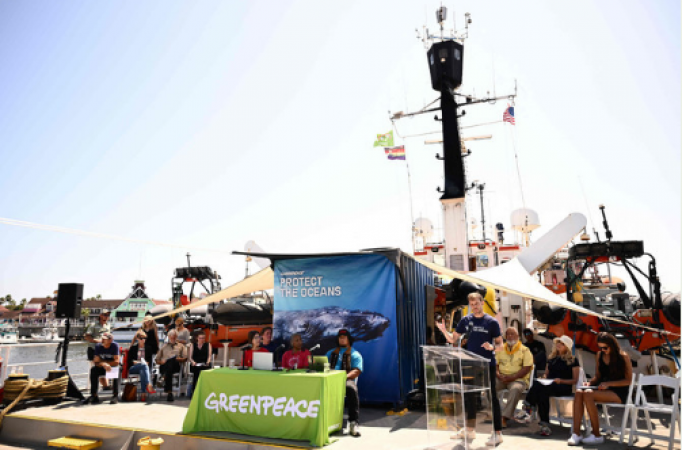
Washington: Environmental organization Greenpeace is sounding the alarm, emphasizing the pressing need for swift action in implementing a new global ocean treaty designed to safeguard the high seas as human-induced threats intensify.
Adopted by the United Nations in June, the global ocean treaty represents a groundbreaking initiative aimed at establishing a comprehensive framework for conserving and sustainably using marine biodiversity in regions beyond national jurisdiction.
Covering over 60% of the world's oceans, the treaty marks the first legally binding agreement designed to address issues pertaining to the high seas.
Also Read: Nissan Magnite Drives into the Spotlight as Official ICC Cricket World Cup Car
While Greenpeace acknowledges the significance of this treaty as a pivotal step in ocean protection, it underscores that its adoption alone is insufficient. The organization is calling upon governments to expedite the ratification of the treaty and take decisive action to enforce its provisions.
Frida Bengtsson, a senior oceans campaigner at Greenpeace, emphasizes that the high seas are currently besieged by a triple threat. This threat comprises overfishing, the impact of climate change, and pollution. Immediate action is imperative to preserve these critical ecosystems before the damage becomes irreversible.
The ocean treaty encompasses essential provisions, including the establishment of marine protected areas within the high seas and regulations governing fishing and other human activities. It also establishes a novel international body, the High Seas Alliance, tasked with overseeing the treaty's implementation.
Also Read: 'Satya' and the Transformation of Indian Crime Cinema
Greenpeace has issued a call to governments, urging them to ratify the treaty during the upcoming United Nations General Assembly meeting in September. Additionally, the organization is advocating for governments to allocate funding for the High Seas Alliance. Furthermore, Greenpeace underscores the necessity of addressing three primary threats to the high seas: overfishing, pollution, and climate change.
Described as the "lungs of the ocean" by Bengtsson, the high seas play a pivotal role in regulating Earth's climate and provide essential sustenance and livelihoods for millions of people worldwide. Preserving these critical oceanic zones is paramount and should be a global priority.
The threats to the high seas are escalating, necessitating immediate action. Overfishing has already become a significant problem, and climate change is causing ocean temperatures to rise and acidity levels to increase. Pollution stemming from ships, land-based sources, and plastics is also a major concern.
The new global ocean treaty marks a substantial milestone in the quest to protect the high seas. However, its successful implementation requires concerted efforts from governments worldwide.
Also Read: KL Rahul's Remarkable Comeback: A Lesson in Perseverance and Resilience
Urgent action is imperative to counteract the escalating threats faced by the high seas. The window of opportunity to safeguard these vital ecosystems is closing rapidly, and the consequences of inaction are too dire to ignore.
Greenpeace's call to action serves as a stark reminder that the fate of the high seas rests in the hands of global leaders and their commitment to preserving this invaluable natural resource for generations to come.